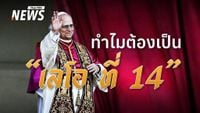On May 8, 2025, the Vatican witnessed a historic moment as Cardinal Robert Francis Prevost was elected as the new Pope, taking the name Pope Leo XIV. This announcement came at 18:08 local time, following a conclave of 133 cardinals who gathered to select the 267th leader of the Catholic Church. The moment was marked by the iconic proclamation of "Habemus Papam" or "We have a Pope," by Cardinal Dominique Mamberti, which sent waves of joy throughout St. Peter's Square.
Pope Leo XIV, at 69 years old, is notable not only for his age but also for being the first American to ascend to the papacy in the history of the Catholic Church. Born in Chicago in 1955 to parents who were both involved in church service, Prevost's journey to the papacy is marked by a deep commitment to missionary work and community service. His extensive background in Peru, where he served as a missionary for over two decades, has shaped his views on social justice and the challenges faced by marginalized communities.
Prevost's election is seen as a continuation of the vision set forth by his predecessor, Pope Francis, who was known for his progressive stance on issues such as immigration, poverty, and environmental concerns. The choice of the name "Leo" is particularly significant; it has been used by 13 previous popes and symbolizes strength, courage, and leadership. The last pope to take this name, Leo XIII, was renowned for his encyclical "Rerum Novarum," which addressed workers' rights and social justice during the Industrial Revolution. This historical context adds depth to Prevost's selection, as it reflects a commitment to those same principles in the modern age.
In his first address as Pope, Leo XIV expressed his admiration for the late Pope Francis, stating, "We continue to hear the soft yet courageous voice of Pope Francis blessing us always." He called for unity among the faithful, urging them to "join as one and hold hands with God to move forward together." Prevost's remarks resonate with the compassionate ethos that characterized Pope Francis's leadership.
Prevost's rise to the papacy follows a notable trajectory within the Catholic Church. He was appointed Bishop of Chiclayo in Peru and later became an archbishop before being elevated to cardinal in January 2023 by Pope Francis himself. His role as head of the Dicastery for Bishops in Latin America positioned him as a key figure in the selection and oversight of bishops, further solidifying his influence within the Church.
One of the interesting aspects of Pope Leo XIV's background is his dual citizenship; he holds both American and Peruvian nationality. This unique perspective is expected to inform his papacy, particularly in addressing global issues that affect both nations. President Dina Boluarte of Peru hailed his election as a "historic moment for Peru and the world," highlighting the significance of having a pope with deep ties to Latin America.
As Pope Leo XIV steps into his new role, he faces the challenge of leading a Church that is grappling with various issues, including clerical abuse scandals and internal divisions. Although he has faced scrutiny regarding allegations of sexual misconduct during his time in Peru, his archdiocese has firmly denied any involvement in cover-ups, emphasizing Prevost's integrity.
The Vatican has emphasized the need for a pope who possesses a "discernment spirit" capable of guiding the Church in a world filled with despair. This reflects a broader desire for a leader who can navigate the complexities of contemporary society while remaining rooted in the Church's teachings.
Pope Leo XIV's election is also notable for its historical resonance. The name "Leo" in Latin translates to "lion," a symbol of strength and courage. This choice aligns with the legacy of Pope Leo I, known as "Leo the Great," who is celebrated for his diplomatic efforts to protect the Roman Empire from invasion. This historical connection serves as a reminder of the enduring power of the papacy in the face of adversity.
In terms of priorities, Pope Leo XIV is expected to continue advocating for the marginalized, focusing on issues such as poverty and immigration, which align with the teachings of Pope Francis. His election is seen as a reaffirmation of the Church's commitment to social justice, particularly in an era marked by technological change and its impact on labor rights.
Furthermore, the tradition of papal name changes is steeped in significance. It symbolizes a rebirth as the pope assumes a new identity, shedding the personal past to take on the responsibilities of the Church. This practice, which dates back to the sixth century, serves to unify the papacy's mission and reinforce its spiritual authority.
As Pope Leo XIV embarks on this new chapter, his focus on professionalism and relationships within the Church is anticipated to resonate with both progressive and conservative factions. His ability to garner support from a diverse group of cardinals during the conclave is indicative of his potential to bridge divides within the Church.
In summary, Pope Leo XIV's election marks a pivotal moment in the history of the Catholic Church. His unique background, commitment to social justice, and emphasis on unity position him as a leader poised to navigate the complexities of modern faith. As he begins his papacy, the world watches closely to see how he will carry forth the legacy of his predecessors while addressing the pressing issues of our time.

